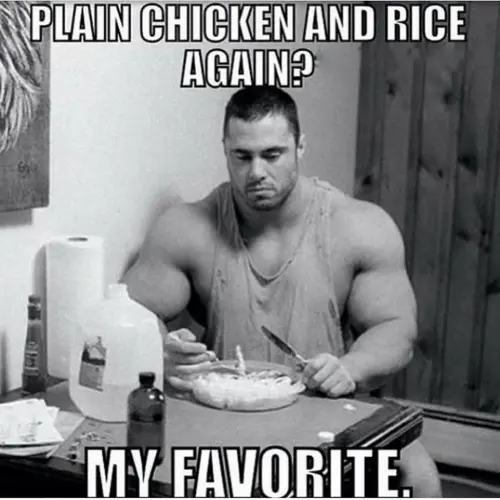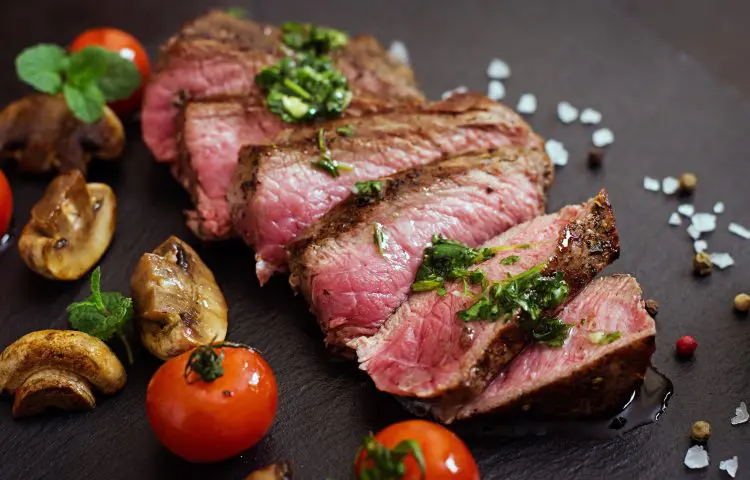From intermittent fasting to IIFYM (If It Fits Your Macros) the dieting world is wrought with new methods and programs at the speed of light. Overnight “solutions” pop up promising the world and then some. With a never ending supply of information it’s easy to understand that many of us are confused, frustrated, and downright fed up with what to do. (Try our Intermittent Fasting Calculator)
With everyone and their brother touting the next great breakthrough on how to lose fat or gain muscle it’s easy to get lost and drown in the sea of misinformation.
Here I want to take a pragmatic view of eating habits, what works, and what you can simply throw out. It’s not rocket science and as Confucius once said, “Life is simple, but we insist on making it complicated.”
The old-school standard

In the pre-internet era, information required reaching out to reputable sources, searching, and looking to established institutions for reliable data. Sifting through literally millions of search results, social media posts, and other fringe resources was never an option.
For many in the fitness industry, the bodybuilding scene dictated much of the doctrine for young people who desired bigger, leaner muscle. Low fat, moderate complex carb, and high protein diets were the old standard. Magazines sold the idea that this was how the pro level bodybuilders achieved herculean, ripped muscle mass.
Level Up Your Fitness: Join our 💪 strong community in Fitness Volt Newsletter. Get daily inspiration, expert-backed workouts, nutrition tips, the latest in strength sports, and the support you need to reach your goals. Subscribe for free!
How could any young nooby not become entranced by the advice of these titans? Who was anybody to argue with their out-of-this-world results?
Of course as time went on, the not so secret of drug use permeated the general public and we entered the age of the internet. This presented the opportunity for every Tom, Dick, and Harry to present their ideas about diet and eating in general. It didn’t take long for a flood of ideas to cascade the web promising to debunk old beliefs and introduce us to extreme diets.
It was as though spite rang across the land of nutrition trying its best to unseat the old standard of thinking. Why do we need to eat five or six times per day? Why did we need to eat protein in equal amounts at each meal? Why can’t we just eat in a smaller window?
But therein lies the problem. All desired results got lumped into the same boat. Want to gain muscle? Try diet “A.” Want to get lean? Try diet “A.” Want to get strong as a house? You guessed it, diet “A.”
We became so blinded by the new shiny things we failed to apply logic. We never looked from a results perspective, instead we looked at it from an ease perspective. How can I get the best results with the least effort?
Too much info?
I’m sure you’re familiar with the term analysis paralysis. It’s the act of becoming so inundated with information that we simply succumb to inaction. We become paralyzed by the sheer amount of content out there.
Keto, intermittent fasting, paleo, IIFYM, and many others have cemented their seat in our nutrition landscape. Everyone from M.D.s to armchair “experts” have taken up arms to defend their almost religious stance on their way being the only way.
But are there commonalities with some diets? Are there underlying, unsaid principles at play? To illustrate, most fat-loss diets that produce legitimate results do one thing very well. They simply reduce calories. Whether it’s carbohydrate, fat, or even protein the massive reduction in calories will reduce body weight.
But if you’re reading this your interest doesn’t lie in the desire to simply lose weight. I’m sure you want to be leaner, gain more muscle mass, and get stronger in the meantime. Right? So how do these extreme diets match up to those goals?
This is how you build muscle
Ask yourself some serious questions. Questions that challenge the very things you hold dear. Do you really think eliminating a large amount of calories from your day will improve strength gains? Does it make logical sense to skip meals for hours on end if your goal is to gain solid muscle mass? Does your body need carbohydrates to fuel your intense training?
Level Up Your Fitness: Join our 💪 strong community in Fitness Volt Newsletter. Get daily inspiration, expert-backed workouts, nutrition tips, the latest in strength sports, and the support you need to reach your goals. Subscribe for free!
As a former skinny guy, I can assure you that I ate food pretty much all day. I couldn’t get enough protein and carbs and I also couldn’t go three hours without eating again. My metabolism was set at the speed of sound. I was churning and burning calories like a madman and it eventually paid off.
Related: What is Skinny Fat and How to Fix It
I needed carbs–a lot of carbs in order to gain just a pound or two in a month’s time. I also needed evenly spaced out hits of protein in order to stay in an anabolic state of protein synthesis. I couldn’t even fathom the thought of fasting, eliminating a macronutrient, or shoving loads of fat into my system.
If you want to gain muscle or lose fat, the old adage of calories in and calories out still holds true. If you want to gain muscle, start simple. Eat about 500 calories over maintenance level. Eat around one gram of protein per pound of body weight and about two or more grams of complex carbs per pound of body weight. Keep healthy fats a bit on the low side since each gram of fat has over twice the amount of calories as protein or carbs.
Evenly space out your meals so your body has an easier time absorbing everything and has a better opportunity to digest the proper amount of protein at each meal. Each month, reevaluate your progress, make small adjustments, and go for another month. Small, singular changes allow you to see what’s working and what’s not. Too much change at once will only confuse your evaluation.
Finally, have patience. Many trending diets promise the world with results expected yesterday. Building real, natural muscle takes time, patience, and a boat-load of hard work.
Real world eating
So how do we get there? We have rough plans in place, we know how to structure our eating habits, and we know we want more muscle. But what now? How will we pull the proverbial trigger in the real world?
Many of us don’t have the luxury of possessing a bodybuilder’s lifestyle. We don’t live at the gym and have an endless supply of money to spend on high-quality food. Instead, we have hectic, often packed schedules preventing a utopian ease of execution. We can’t cook high-quality steaks, take the most expensive supplements, and have flawless meal timing.
We must start in the most logical sense possible. We need to look at what’s available to us, what our schedules allow, and more efficient ways of putting our plans into action.
Some things to consider about dieting in the real world:
- Be prepared. Bring your meals to work/school. Always have your specific food available to you no matter where you are. It’s too easy and tempting to grab some fast food when you’re famished.
- Look for variety and affordable options for protein. Greek yogurt, cottage cheese, eggs, jerky, mixed nuts, whey protein, and some canned tuna or chicken are excellent ways to ensure you’re getting in the good stuff no matter where you are.
- Ingrain daily healthy habits. Make your schedule of meals a solid part of your day. Take it seriously. Consistency is integral to your success.
Find your daily protein intake here.
Old school eating

Finally, it’s time to decide on what eating plan to adopt. As stated before, if your goal is to gain muscle, fasting for the majority of the day won’t work. You need to eat several times per day to get in a consistent dose of protein. And make sure you’re a bit over maintenance regarding calories. You can’t underfeed your gym efforts.
Below is a sample diet. It isn’t specifically for any particular body weight, but more about the types of food, meal frequency, and daily structure regarding eating around training. It’s also designed with the layman in mind.
Meal 1: (breakfast)
- Oatmeal, cream of wheat, or whole grain pancakes
- Greek yogurt, eggs, whey protein
Meal 2: (mid morning)
Handful of mixed nuts, protein bar, or low fat cottage cheese
- Meal 3: (lunch)
- Lean turkey sandwich
- Piece of fruit
Meal 4: (optional pre workout)
- Piece of fruit
- Whole wheat sandwich with natural peanut butter
Meal 5: (post workout)
- Why protein shake or meal replacement drink
Meal 6: (dinner)
- Lean protein such as chicken, turkey, beef, or fish
- Veggies such as sweet or white potato or rice
- Other green veggies
In closing
Gaining muscle in the real world is possible sans the expensive supplements and mounds of grass-fed, organic prime beef. There are ways to pack on the quality weight while keeping your budget sane. All it takes is a little creativity, some preplanning, and some serious consistency.
It’s not rocket science. Building muscle, losing fat, or whatever your goal happens to be doesn’t have to be a product of the latest, trendy diet or viral hype. Take a logical view and plan accordingly.














